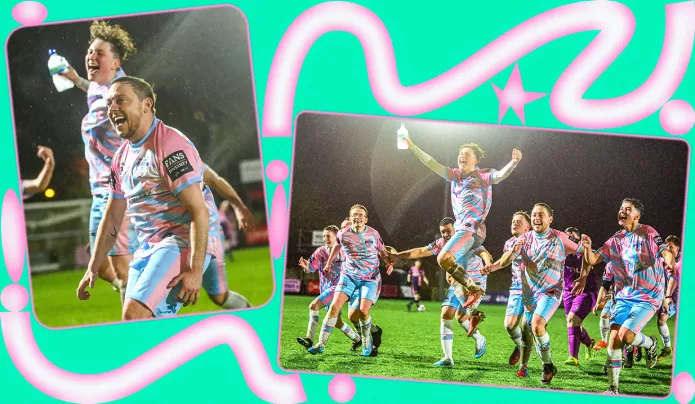Grassroots solutions
Of course, the conversation around trans inclusion at an elite level is important and shouldn’t take a back seat. After all, recent developments in the world of women’s football – namely the government-backed recommendations that the FA commit to the full professionalisation of the women’s game – show that the archaic rules of the game can and should be updated for modern times.
However, there’s no denying that the gender binary is deeply ingrained in professional sports – it’s likely that unpicking this system will be a drawn-out process. In the interim, more casual players can look towards the thriving world of LGBTQIA+ teams. Here, weekly kickabouts allow players of all identities to get stuck into their favourite sport. These are teams where queer and trans inclusion is a prerequisite – not an afterthought.
TRUK United FC, which is headquartered in London but welcomes players across the UK, is a prime example. Open to all, but with matches and teams subject to restrictions depending on opponents, the club was founded in 2021 by Lucy Clark, English football’s first transgender referee. A year later, in 2022, the club made history after their all trans women team played a match against Dulwich Hamlet Women’s FC on Trans Day of Visibility.
It seems the club is turning making history into a habit. On the following Trans Day of Visibility, a TRUK United FC team solely consisting of trans men and transmasculine people (the first of its kind in Europe) played against cis male players from Dulwich Hamlet FC Supporters Team.
Reflecting on that evening, Clark has fond memories. “People attended on a rainy night in Dulwich and the whole evening was full of trans joy,” she proudly explains. “The night will live in the memory of everyone that was in attendance for a long time to come.” Going into 2024, she has one clear goal in mind: “We also plan to have a team solely of non-binary people soon.”
So proud to have been captain of the first ever football team of all transgender men in Europe!
It was such a special night, thank you to the boys for being incredible and to all our supporters!
Football is for everyone. 🏳️⚧️🏳️⚧️🏳️⚧️#TransDayOfVisibility pic.twitter.com/t2FlIvcBCC
— Arthur Webber 🏳️🌈🏳️⚧️ (@BernieTranders) March 31, 2023
Arthur Webber, who captained the TRUK United FC match against Dulwich, explains that playing football amongst cis players can come with the kind of psychological stress that isn’t present in trans-centred environments. “[Before] I felt a need to prove my worth to the cis players and a lot of pressure to perform,” Webber explains. Conversely, playing on a transmasculine team has helped him to rediscover his confidence as a player.
This is a similar story to that of Paula Griffin, a member of the TRUK United FC Women’s team and goalkeeper for the Clapton CFC Women’s first team. For her, TRUK United FC helped to reintegrate her back into the sport by creating a truly inclusive environment. “Having the opportunity to play for TRUK opened up my eyes to the possibility of playing competitive football for the first time since my youth,” Griffin explains.
As a community organiser, Clark’s passion for trans inclusivity and, more crucially, trans joy within sport is evident. “It’s really important that trans people continue to play whatever sport they love, this goes for the whole LGBTQIA+ community,” she says. “Sport is great for physical and mental health and people should not stop playing sport just because of their identity.”
As human beings it’s vital for our sense of purpose and quality of life to be able to proudly and safely pursue our passions and interests – a basic need many trans people can struggle to attain in the world of sport because of discrimination and exclusionary regulations. As clubs like TRUK United FC continue to thrive, let’s hope they allow more and more trans people to safely take to the pitch to focus on what really matters – getting that ball firmly in the back of the net.
